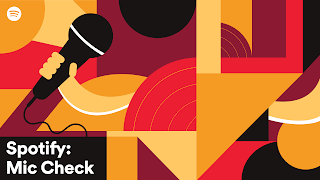If you love music -- and all kinds of music -- then Spotify: Mic Check is the podcast for you. It certainly is for me. In each episode, I'm either treated to music from a culture or genre that I'm not familiar with, or the most fascinating people in the music business are interviewed.
This week’s episode of Spotify: Mic Check, features GRAMMY award-winning British songwriter, Kamille discussing her evolution from songwriter to artist. Camille Angelina Purcell, known professionally as Kamille is an English singer, songwriter, producer and record label owner.
Kamille has collaborated with other globally successful artists, achieving multiple successes. In 2018, she achieved two UK #1 singles back-to-back, first with ‘I'll Be There’ co-written for Jess Glynne, immediately followed by ‘Solo’ co-written for Clean Bandit featuring Demi Lovato. ‘Solo’ was named the ‘most-Shazamed’ song of 2018. Kamille's achievements were recognized at the A&R Awards 2018 where she won Songwriter of the Year.
In 2020, Kamille was nominated for the Mercury Prize for her work on Dua Lipa's album ‘Future Nostalgia’, and she contributed to five UK Top 10 Singles.
Throughout her career, Kamille has worked with some of music’s biggest names, including Dua Lipa, Little Mix, Bebe Rexha, David Guetta, The Saturdays, and more. Nearly seven billion streams later, Kamille has shifted her focus to producing her own music.
In this episode of Spotify: Mic Check, Kamille opens up about her songwriting process, collaborating with other artists, transitioning from a stockbroker to an artist, and more.
You can listen to the full episode here.
Available to stream for free exclusively on Spotify, please see below for interview highlights in the episode:
- Kamille on her love of songwriting and getting back into the studio after being mugged.
- “I would stay in the studio so late at night, even when I had work earlier that day. And I remember even one time I got mugged, like walking home really late night and these, you know, guys just came and stole my phone and pushed me over, and it was raining, and it was such a like low moment for me in my life. But I still went back to that studio, and that's how much I wanted to be there.”
- Kamille on leaving her job as a stockbroker to pursue music and songwriting after cutting her first hit.
- “And yeah, I just decided to leave my job because I was like, Listen, this is what I want to do. It felt really easy writing that song. I'm not going to lie like it was, but I think that's because it came easy to me, not because it was an easy thing… And hearing that song on the radio, was like – you can't imagine, for me. I'd never done anything like that before. And I’d pull up to that traffic light and hear people playing it in the car next to me. And I’d be like, oh, my gosh, what the hell? Like, it was just such an amazing buzz, and I never wanted to ever, ever lose that.”
- Kamille on songwriting and collaborating with others.
- “Kamille: Oh, I do like to get to know artists first, like on a very deep level. I'll try my best like I stalk them a lot, probably before I even get to the session. So I already know facts. Like Daily Mail is just so good for me before I meet people, cause I be all up in there like researching. And so then when they talk about stuff, I kind of know about it. It's the same thing, like when you're going to apply for a new job, you kind of learn about the company a bit don’t you? You don’t want to go in there not knowing anything. So that's really important. But I mean, I tend to really just open myself up, I think, and that allows them to feel comfortable too.”
- Kamille on how her start as a songwriter humbled her in the transition to becoming an artist.
- “I think starting as a songwriter really shaped my career as an artist because it just taught me so much. Funnily enough, I think the main thing it taught me was to be kind in this industry, and I know that's so random and probably not what people would expect. But I saw, in probably the first four years of my career, just so many different people would come and go. It was so short-lived. It scared me so much. I couldn't believe someone could be so big one year and then completely vanish the next. I think that's one of the craziest things about this industry.”
You can listen to the full episode here. It's a great listen.

Comments
Post a Comment
Thank You for your input and feedback. If you requested a response, we will do so as soon as possible.